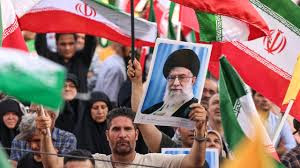The Martians came in fire and death, toppling the proudest empires and rendering national boundaries meaningless. But in the smoldering aftermath of the War of the Worlds, as humanity grapples with rebuilding civilization, one of the most unexpected consequences has been the tentative thawing of one of the Middle East’s most entrenched rivalries: that of Iran and Israel.
Prior to the Martian invasion, the two nations stood as bitter adversaries, locked in a decades-long cold conflict characterized by cyberattacks, regional proxy wars, and ideological hostility. Iran’s theocratic regime viewed the existence of Israel as illegitimate, while Israel regarded Iran as its most existential threat, particularly due to its nuclear ambitions and influence over groups like Hezbollah.
A Common Enemy from the Stars
The initial wave of the Martian onslaught targeted major urban centers. Tel Aviv and Tehran both suffered extensive damage within days. Earth’s defense systems—national armies, nuclear arsenals, and satellite networks—proved powerless against the superior Martian technology.
Amidst the chaos, a remarkable thing happened: communication channels opened. According to leaked documents later confirmed by the United Nations Reconstruction Authority (UNRA), Israeli and Iranian military liaisons shared information in real time about Martian troop movements, shelter networks, and safe extraction corridors.
“We realized that no ideology survives a heat-ray,” said Commander Hadi Sharifi, an Iranian Air Force officer who coordinated refugee evacuation zones with an Israeli counterpart in Jordan. “They didn’t care if you were Shiite or Jewish. They wanted the planet.”
This unprecedented cooperation was not driven by diplomacy but desperation. And yet, the bonds forged under the shadow of annihilation have proved surprisingly resilient.
From Survivors to Diplomats
In the months following the Martians’ mysterious death from Earth’s microbes—a twist of fate biology may never fully explain—survivors emerged from bunkers, caves, and underground cities. With infrastructure devastated, the focus shifted to rebuilding essential services and governance.
Israel and Iran both signed on to the UNRA-led “Planetary Recovery Accord” in Geneva, which established a provisional Global Reconstruction Committee. For the first time in history, Israeli and Iranian officials worked side by side in a non-combat capacity.
Behind closed doors, more remarkable shifts were taking place.
In January 2025, Iranian Foreign Minister Afsaneh Darvishi and Israeli Minister of Foreign Affairs Levi Bar-Zohar met in neutral territory in Astana, Kazakhstan. The topic: joint recovery zones in the former Iraqi territory, where displaced citizens from both nations had mingled and formed ad hoc communities during the war.
“It was surreal,” Bar-Zohar later said in an interview. “We were discussing shared water purification systems, not missile defense. For the first time, we saw each other as humans.”
Challenges Remain
Despite these hopeful signs, deep-rooted distrust has not disappeared. Iran’s Supreme Leader Ayatollah Khamenei has not publicly acknowledged the dialogue with Israel, and hardliners within both governments have condemned the cooperation as betrayal.
Moreover, the post-Martian world has led to new forms of competition. Scarce resources, particularly clean water, arable land, and technological salvage from the Martian wreckage, are intensifying disputes in former conflict zones.
One incident in April 2025 saw Iranian militia groups clash with Israeli reconstruction teams near the ruins of Mosul over control of an intact Martian energy pod. The skirmish, though brief, was a chilling reminder that Earth’s old conflicts are not easily erased.
A Fragile Hope
Still, many believe the shared trauma of the invasion offers a unique opportunity. Grassroots organizations in both nations have sprung up promoting interfaith dialogue, survivor exchange programs, and joint memorials for Martian War casualties.
One notable example is the “Human First” initiative, a network of Iranian and Israeli students who are documenting stories from the invasion across borders. “We all lost so much,” said Yasmin Kohani, an Israeli student volunteer. “If we can’t come together now, after this, when will we?”
The War of the Worlds ended with Earth’s unlikely victory, but the battle for peace among its survivors has only just begun. For Iran and Israel, the post-Martian era represents both a reckoning and a rare second chance. History has shown that enemies can become allies when faced with extinction. Whether this new understanding will last is uncertain, but for the first time in a generation, the possibility exists.





No comments:
Post a Comment